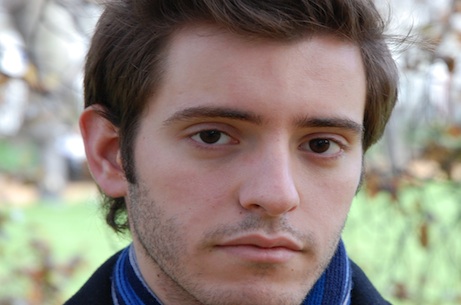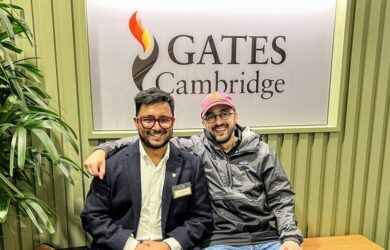
David Jimenez Torres' research looks at the origins of modern Spanish concerns about the country's national identity.
What does the future hold for Spain, a country facing dire economic problems which have exacerbated existing tensions? Many of those relate to Spain’s fractious sense of identity, widely regarded as the biggest political issue in the country for the last 100 years. Witness last week’s elections in Catalunya which centred on calls for Catalan independence.
For David Jimenez Torres [2009] understanding the history of the nationalist question and Spain’s response to it is critical. His PhD focuses on the work of the Spanish sociopolitical theorist and journalist Ramiro de Maeztu, whose first book Hacia otra España (“Toward Another Spain”) called for Spain to break with its past and enter the European mainstream.
Maeztu left Spain after the defeat of the Spanish empire in 1898 and lived in the UK from 1905 to 1919. “I’m interested in how a country markets itself and what it is about that that makes a person uproot themselves to come there,” says David. Maeztu lived abroad, but with the idea of learning from his experience in order to make Spain a better country, he says. “He was interested in learning the secrets of a successful nation and how they could be transferred to Spain. It was a time when Spanish identity was in crisis after the loss of its empire. A lot of people became introspective and more conservative whereas Maeztu looked outwards at how Spain could imitate other nations’ success without losing its own identity.”
David grew up in a family which was affected by Spain’s nationalist tensions more than most. His father is the controversial award-winning journalist Federico Jimenez Losantos who has been very outspoken on questions of Spanish nationalism. In 1981 the Catalan terrorist group Terra Lliure made an attempt on his life which subsequently forced him to move from Barcelona to Madrid, where David was born.
David says he cannot remember a time when his father did not have a bodyguard. “As I grew older I realised that not everyone’s life was like that,” he says. He has come to terms with it, he adds. “I’m happy to be with the people who have the bodyguards rather than the people who seek to kill them,” he says.”
When David was nine the family were forced to move to the US due to the political situation in Spain, and particularly in relation to the Basque conflict, which made life quite difficult for a number of journalists during the 80s and 90s. David didn’t speak a word of English. It was hard, he admits, but it was also exciting moving to the US which he had only seen in the movies before.
As a child he was very bookish and says he wanted to be a writer from as long as he can remember. At 15, he asked his parents if they could send him to boarding school in the US. He says one of the reasons was his frustration with the way the Spanish education system works. For him there is too much focus on language and not enough on literature. “I wanted to read and write,” he says, adding that both his parents are very well read.
Different perspectives
He was sent to a boarding school in New Jersey and hasn’t been back to live in Spain since. It was an interesting experience. “It was very much a sink or swim experience and I swam,” he says. He met people from all over the world. His room-mates were from Venezuela and Bahrain. “It was very eye-opening,” he says. He was happy there, particularly since the literature classes “were actually about literature” and he asked to stay until the end of high school.
Then he applied to Washington University in St Louis and did a double major in English and History. He chose the university because it was highly ranked. He took a lot of creative writing classes, but says history was a good counterbalance by placing the literature in context and countering the subjectivity of literature with the quest for objective truth in history.
During his four-year course he spent one year in London. He also had a novel published in Spain. It was about a Spanish boy who went to the US. David wrote it in the year after he finished high school. “I wanted to try writing a full-length novel and I showed it to people who said I should publish it. One of the reviews, however, said it was dangerous to be published so young. I now understand what they meant, although at the time I was in the dizziness of the whole experience. Though the reviews were good, the book didn’t sell so well which has made it difficult to publish other work,” says David.
“The experience certainly hasn’t put him off writing though and he has set up a writing workshop at Cambridge along with another Gates scholar.”
After his undergraduate degree, David was keen to come back to Europe to do his masters to be closer to home. He did not want to go back to Spain, though. The UK seemed the perfect middle ground and he had already lived there. He was drawn to Cambridge because of its history and his supervisor. For his MPhil, for which he received a bursary, he studied European literature and culture in the Modern and Medieval Languages faculty. He did his dissertation on Maeztu. “I was making the transition from English to Spanish literature and culture and was trying to do a mini BA to catch up on Spanish literature,” says David.
At the same time and in the year between his MPhil and PhD he was doing quite a bit of journalism, mainly for his father’s online newspaper, Libertad Digital.
David, who is writing up his PhD, wants to go back to Spain when it is finished, but he is concerned about the employment situation there. “It seems self indulgent to enjoy a calm exile when things are so bad there,” he says. “I would like to see if there is anything I can do there to help the country.”












